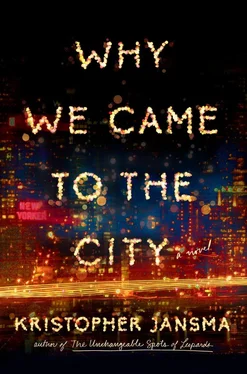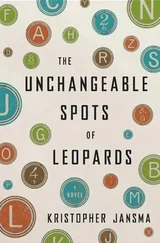Sara rode the bus all the way down to Whitehall Station. There, it went around the block and began to carry her back up again.
OCTOBER
George stared at his smooth white coffee cup, determined that, by the time he finished it, his life would be forever changed. Before this burned Starbucks coffee, he’d been George Murphy, jovial drinker, perhaps at times a little weak willed, not just with alcohol but with many things: sleeping past his alarm, eating at the McDonald’s drive-through when he was in a hurry (and also when he wasn’t), spending too much money on things he didn’t need (at this he glanced guiltily toward the bulging Barnes & Noble bag on the seat beside him), and listening to the same rock music he liked in college, even though he knew it put him in an angry mood. Before this cup of burned coffee, yes, he’d been a man of bad, unbreakable habits. And yes, he, like the rest of them, had begun to go a little crazy with everything that was going on lately.
But after this cup, an entirely new George would emerge. A George more like these other productive and wholesome people at the bookstore café! A George who listened to peaceful, acoustic, harmonious songs like the one playing overhead, “Not Worth Fighting” by Envoy. This would be the soundtrack of the new, punctual, in-shape, fiscally responsible George.
Most important, the sober George. He wouldn’t have another drink. These days it brought him little of the weightless joy it once had. More often than not, now, it just weighed him down more. It made him hazy and slow-witted. It was hard to admit it, even just to himself, but it had cost him a potential job at Harvard. He’d been lucky enough they’d called him, but now it had been weeks. Who was he kidding? He’d been so wretchedly nervous before the interview that he’d popped into a bar to calm down, thinking it might help to be around some people. He’d just had one beer. Full of confidence, he’d walked into the room where Drs. McManus and Schwartz from the physics department were waiting to interview him. Then, paralyzed by the certainty that the men could smell the suds on his breath, George had found himself barely able to answer even their simplest questions about the collapse of 237 Lyrae V.
Well, no more. That was the old George Murphy. Forever he would look back on that moment as the turning point — well, as a turning point that had then led to this turning point — to this cup of burned coffee, after which nothing would ever be the same.
Because now he had a reason to turn it all around. And screw his own well-being and his own future — those had been proven to be woefully inadequate to the task. That’s why he’d been put between this rock and a hard place. Thank God it wasn’t Sara.
“Thank you,” he said out loud.
No one in the café even turned their head as he spoke to himself. They were all busily tapping away on their laptops, earbuds shoved halfway down their eustachian tubes. He heard no clinking of glasses or gurgling of taps, just the occasional bulldozer burping of the milk frother, and the jackhammer grinding of the Frappuccino machine. Otherwise, eerie silence prevailed throughout the café. When you said a prayer from a barstool, you could count on the guy two down from you to raise his glass and say “Amen.” Drunks were just polite that way.
George’s mother had always believed that a prayer had to be said out loud to really warrant heavenly attention. As a boy, he had said his nightly “Now I lay me down to sleep” at a normal volume, as if speaking to someone on the other side of the bed. The habit had stayed on at college. Jacob was a night showerer, and so George had been able to keep it up without him realizing. Once Jacob had come back for a forgotten razor blade and come quite close to catching him. “Talking to yourself, Georgie-boy? You know some people would say that’s a bad sign, but I recommend you really engage with those voices in your head. It’s important to listen. You really want to do exactly what they say.”
What a bastard! But God, how George loved him. No one else made him laugh so hard. He and Irene were like the siblings George had never had. And now God was taking her away from him, from all of them, and George hated His ever-living guts for it.
But he had to do it. He had to give Him what He wanted. In the end, Jacob hadn’t been the reason George stopped praying. Nor had he been at all persuaded by the “evil liberal atheist communist professors” Grandpa Earl had warned him about. No, when the professors spoke about the cosmos being big and him being infinitesimally small, it had only reassured George of his irrelevance before forces he could never hope to control or understand. First Darwin and then Nietzsche had failed to kill his God.
And then, during a seminar on Einstein and relativity, George had had a real epiphany: for every observable phenomenon, there were a million unobservable ones. So many things that his senses told him were true were only illusory: the straightness of time’s arrow; the existence of only three dimensions; the solidity of rocks and the fluidity of water. Every simple, rational phenomenon was eventually unexplained by something wildly problematic and complex. He had no trouble believing that God and heaven could exist within the vastness that his brilliant professors couldn’t define with formulas and hypotheses. And George believed in miracles and coincidences and mysterious ways. But he also believed that no matter how good a person he’d tried to be in every other respect, God had no mercy on he who’d begun having a nip of J&B each night while his roommate showered, instead of praying the Lord his soul to keep.
Now it was time to make a new bet. Now it was all on his shoulders. Irene needed him, and George had been stone-cold sober for three days. Not such a long time, but it was a start. He slapped his palm on the little café table. Then he said a quick Hail Mary, successfully spooking an old Chinese couple sitting at the table next to him. He polished off the last of his coffee and crushed the white paper cup in his hand. He lifted his shopping bag, and the plastic dug into his hand as he carried it across the street between the honking, blaring cars trying to get onto Queens Boulevard. By the time he got to the other side, he’d be a new man.
Across the street Irene and Mrs. Cho spoke amiably on the steps outside Super-Wellness Spa & Nails! owned by one of William’s aunts. George approached with a wave, hoping they hadn’t been waiting long. Spiritual revelations were important and all, but Irene couldn’t risk getting the flu, and September had ended with an unsparing cold front coming down from Canada, sending everyone scrambling for air-conditioner covers and pulling wool sweaters out of deep storage. Everyone George encountered seemed to be coming down with something, and Sara was Purell-ing everyone’s hands every five seconds, so Irene wouldn’t catch pneumonia.
Irene, at least, seemed to be glad about the sudden need for extra layers, as loose sweaters were gratefully in that fall — at least this was what she’d told George when he’d taken her to Anthropologie after her appointment last Saturday — and perfectly suited to covering the nub of the PEG tube that was taped flat against her stomach. She’d managed to keep her weight steady, and Dr. Zarrani had seen “positive signs” from the latest scans. The tumors seemed to be responding to these new experimental drugs. No one knew what tipped the scales for one person and not for the next. A PET scan could only see so much.
So there was cause for hope. George wasn’t too proud to beg God for help. Better men than him had done it, and plenty worse had seen mercy.
Читать дальше












